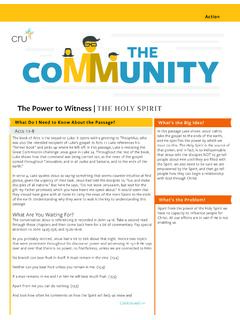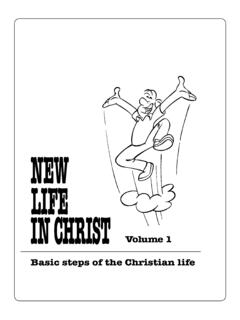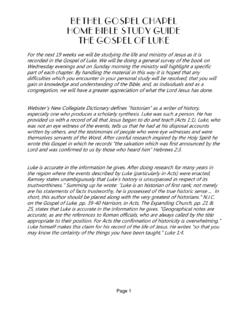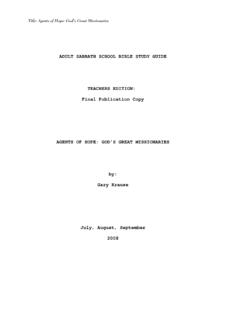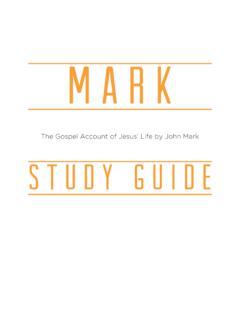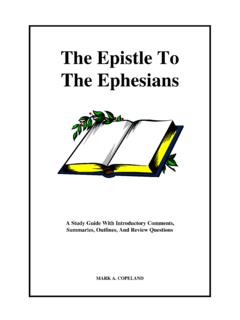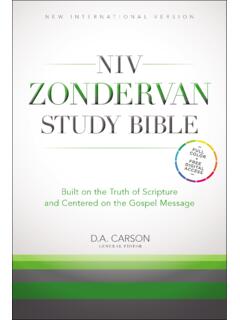Transcription of THE GOD WHO IS BIBLE STUDY
1 The heart behind this series was to provide an avenue for staff and students to take the Winter Conference home with them to continue growing in their knowledge of who God is and, hopefully, in their intimacy with lesson focuses on a specific facet of God by studying one passage of Scripture. The lessons really dig into the Word, but the leader s guides are thorough enough so that a student can teach the the lessons can be used for individual STUDY , they were designed to be used in a discussion group format. The group leader has the group read the passage together, then guides them through the discussion questions. At the end of the lesson is a list of passages for further STUDY that the student can look at later as well as questions for personal reflection . The leader will need to prepare ahead of time, but the group members do not have to. You have the freedom to change the order of the material, but you will want to be careful.
2 The lessons were put in this order with a view toward balance. Order of Lessons:Lesson 1 IntroductionLesson 2 God Is LoveLesson 3 Holy, Holy, HolyLesson 4 Gracious and Merciful Father Lesson 5 Jesus, Our Substitute on the Cross Lesson 6 The Father Who Disciplines Lesson 7 Jesus, The Humble ServantLesson 8 The God Beyond Compare Lesson 9 The God of All ComfortTHE GOD WHO IS BIBLE STUDYINVESTIGATIVE BIBLE STUDY 1 THE GOD WHO IS BIBLE STUDY 1 BackgroundBackgroundBackgroundBackground The book of Acts was written by a physician named Luke, probably around 60-62 AD. Acts is an historical narrative, or story, that picks up where the gospel of Luke leaves off, and traces the rise and spread of the early Christian church. In Acts 17 we see a snapshot of the life of the Apostle Paul. Paul had been a Jew who was so de-vout in his faith that he actually persecuted and killed Christians.
3 But one day Jesus, who had already lived on earth, been crucified and resurrected, appeared to Paul in person while Paul was walking down the road (see Acts 9). The encounter was so powerful that Paul became not only a Christian, but also the greatest Christian mis-sionary who has ever lived. Luke was a close friend of Paul s who often traveled on his missionary trips with him. The events of Acts 17 take place in Athens, Greece, the intellectual capital of the world at the time. RRRRead Acts 17:16ead Acts 17:16ead Acts 17:16ead Acts 17:16----34343434 In this passage, Paul stands up in the meeting of the Areopagus and makes known the unknown god . What facts does he emphasize about God in vv. 24-27? God created the whole world He is the Lord, or Ruler, of Heaven and Earth He doesn t need anything we, as humans, can give Him He is the source of all life He determined exactly when and where every person would live God desires people to seek Him He is not far from us **Ask the members of your group which of these is most meaningful to them and why.
4 Notice how many times Paul uses words like all , every and everything . What do you think is the significance of this? How does God make Himself known today? The key answer here that we want to get across is from His word, the BIBLE but he does also make Himself known through nature, and expresses Himself through the lives of Spirit-filled Christians Paul s statements certainly challenged the Athenians view of God. (Some further background: the Epicureans main goal in life was seeking pleasure, and the Stoics emphasized rational thought and self-sufficiency.) How does the BIBLE , particularly the above passage, challenge to-day s misconceptions about God? The whole issue of creationism People think they run their own lives and don t have to answer to anyone Many think that God doesn t really care about the day in/day out of our lives He seems distant Humanistic thought (that man is the highest being) etc.
5 In vv. 29-31, Paul was obviously concerned that people would not worship idols, but instead worship the one true God, the God who is . Today in America, we wouldn t usually form idols out of gold or silver or stone ( ), but we can still worship other people or things above God. What are some of the things we idolize above God? 2001 Campus Crusade for Christ, Inc. Permission granted to copy for personal or ministry uses, provided this credit line is included and con-tent remains unchanged. Introductory Lesson Acts 17:16-34 Leader s Guide The God Who Is BackgroundBackgroundBackgroundBackground The book of Acts was written by a physician named Luke, probably around 60-62 AD. Acts is an historical narrative, or story, that picks up where the gospel of Luke leaves off, and traces the rise and spread of the early Christian church. In Acts 17 we see a snapshot of the life of the Apostle Paul.
6 Paul had been a Jew who was so de-vout in his faith that he actually persecuted and killed Christians. But one day Jesus, who had already lived on earth, been crucified and resurrected, appeared to Paul in person while Paul was walking down the road (see Acts 9). The encounter was so powerful that Paul became not only a Christian, but also the greatest Christian mis-sionary who has ever lived. Luke was a close friend of Paul s who often traveled on his missionary trips with him. The events of Acts 17 take place in Athens, Greece, the intellectual capital of the world at the time. RRRRead Acts 17:16ead Acts 17:16ead Acts 17:16ead Acts 17 In this passage, Paul stands up in the meeting of the Areopagus and makes known the unknown god . What facts does he emphasize about God in vv. 24-27? Notice how many times Paul uses words like all , every and everything . What do you think is the significance of this?
7 How does God make Himself known today? Paul s statements certainly challenged the Athenians view of God. (Some further background: the Epicureans main goal in life was seeking pleasure, and the Stoics emphasized rational thought and self-sufficiency.) How does the BIBLE , particularly the above passage, challenge to-day s misconceptions about God? In vv. 29-31, Paul was obviously concerned that people would not worship idols, but instead worship the one true God, the God who is . Today in America, we wouldn t usually form idols out of gold or silver or stone ( ), but we can still worship other people or things above God. What are some of the things we idolize above God? 2001 Campus Crusade for Christ, Inc. Permission granted to copy for personal or ministry uses, pro-vided this credit line is included and content remains unchanged. The God Who Is Introductory Lesson Acts 17:16-34 Paul explains that God doesn t want people to worship idols, but instead He commands all peo-ple to repent (v.)
8 30). What does the word repent mean? Who is the man that Paul writes about in v. 31? How does it make you feel that one day God will judge the world with justice ( )? When God judges you, will you be declared guilty or innocent ? We learn from other passages in the BIBLE (Romans 3:21-26; Hebrews 9:26-28) that Jesus is not only the man who will justly judge us as guilty , but He will also serve our sentence (of death) in our place if we will only trust in Him. How does that make you feel? Questions For Personal Reflection:Questions For Personal Reflection:Questions For Personal Reflection:Questions For Personal Reflection: 1. Reread Acts 17:32-34. When you hear about the resurrection of Jesus, are you: 1) One who sneers? 2) One who wants to hear more on the subject? 3) One who believes and follows? 4) 2. Are you trusting in yourself to be declared innocent when God judges you, or are you trust-ing in Jesus Christ to be your substitute?
9 3. What do you need to repent of? Is there sin in your life you need to turn from? 4. Do you know God well enough that if the leading philosophers of our day say, your pro-fessors--asked you to explain Him, you could? 5. What can you do this week to get to know the God who is better? 6. Go back this week and look at Acts 17:24-27 and reflect on the God who is . There is a God we want, and there is a God who is and they are not the same God. The turning point of our lives is when we stop seeking the God we want and start seeking the God who is. The God Who Is Introductory Lesson page 2 Acts 17:16-34 Passages For Further STUDY : Job 38-41 Colossians 1:13-23 John 1:1-5 Hebrews 9:26-28 Romans 3:21-26; 5:6-8 2001 Campus Crusade for Christ, Inc. Permission granted to copy for personal or ministry uses, pro-vided this credit line is included and content remains unchanged.
10 Paul explains that God doesn t want people to worship idols, but instead He commands all peo-ple to repent (v. 30). What does the word repent mean? Some dictionary definitions: to feel regretful for past conduct , to turn from sin and dedicate oneself to the amendment of one s life , to change one s mind It s the idea that where we once thought that WE were right, we now see that GOD was right and we were wrong. Who is the man that Paul writes about in v. 31? Jesus Christ How does it make you feel that one day God will judge the world with justice ( )? When God judges you, will you be declared guilty or innocent ? We learn from other passages in the BIBLE (Romans 3:21-26; Hebrews 9:26-28) that Jesus is not only the man who will justly judge us as guilty , but He will also serve our sentence (of death) in our place if we will only trust in Him. How does that make you feel?
